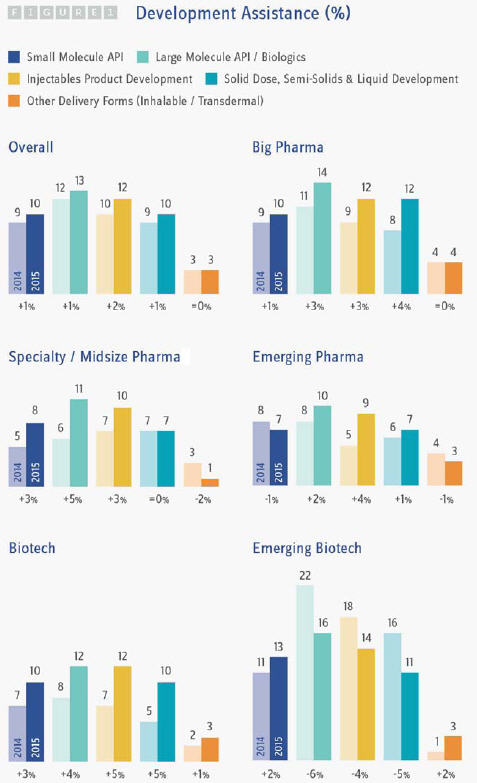The CDMO Model And Outsourcing Development

By Kate Hammeke, VP of Market Research, Industry Standard Research (ISR) @ISRreports
In 2014, the biopharmaceutical industry witnessed more and more contract suppliers take on the CDMO (contract development and manufacturing organization) acronym to identify their ability to assist at the development stage of drug manufacturing. These businesses can provide comprehensive services, from drug development through to manufacturing commercial supply, and are interested in differentiating their abilities from CMOs focused solely on large-scale manufacturing projects.
 Theoretically, the CDMO is positioned for a strategic partnership, with expertise in areas the drug innovator seeks, whereas the CMO may be viewed as a tactical provider that has the available capacity to compete for the project. This perception has influenced many contract manufacturers to embrace the CDMO term as an additional advantage in the effort to develop long-term partnerships.
Theoretically, the CDMO is positioned for a strategic partnership, with expertise in areas the drug innovator seeks, whereas the CMO may be viewed as a tactical provider that has the available capacity to compete for the project. This perception has influenced many contract manufacturers to embrace the CDMO term as an additional advantage in the effort to develop long-term partnerships.
Utilizing a CRO or CMO for early-stage analytical, stability, preformulation, formulation development, and drug delivery method has become more common in the pharmaceutical industry and is anticipated to increase as the strategic partnerships between drug innovators and contract suppliers mature. This creates more opportunities to secure business from drug innovators across the drug’s life cycle. In 2014, Nice Insight began tracking the development offering separately from commercial-scale production in order to keep abreast of buyer activities at the development stage and to identify whether CMOs offering development- stage services would have an advantage over the competition when it comes to strategic partnerships.
The results from the 2015 study (released Jan. 1) show that 10 percent of respondents stated their company will engage a CMO for small molecule API development, and 10 percent would outsource solid/semisolid or liquid dosage form development. Thirteen percent stated they would engage a CMO for large molecule API development and 12 percent for injectable product development. In comparing the overall data for 2014 and 2015, there was little change in the percentage of respondents who anticipated engaging a CMO for assistance with API or dosage form development — only 1 and 2 percentage point increases. However, regarding the activities within the various buyer categories, the data showed more variances.
Interestingly, larger companies tended to take advantage of outsourced development assistance with greater frequency than smaller companies. While this results from a variety of factors, from larger outsourcing expenditures, to using CMOs and CROs for a higher number of services in general, and to having a larger pipeline for potential therapeutics, it conflicts with the notion that Big Pharma and Big Biotech have in-house development expertise. This supports the finding that outsourcers, regardless of company type, are looking to CMOs for expertise — a shift in from historic usage where a CMO’s primary purpose was to provide needed capacity.
OUTSOURCERS, REGARDLESS OF COMPANY TYPE, ARE LOOKING TO CMOs FOR EXPERTISE
Big Pharma and midsize companies showed an increase greater than 2 percentage points in three of five development categories, whereas emerging pharma showed increased outsourcing in only one category. Biotech companies showed an increase in four of five categories; however, emerging biotech did not have any increases greater than 2 percentage points. As a matter of fact, emerging biotechs indicated decreased outsourcing in three categories of development services when compared to 2014 behavior. It is important to mention that emerging biotech companies engaged a CMO for development assistance at the highest rates out of the five buyer categories in 2014 and 2015, despite these downshifts over last year predicted for 2015.
Biopharma companies’ increased usage of CMOs for development activities corresponds with a significant rise in interest in strategic partnerships. These changes support the theory that offering development services will make the CDMO more appealing to a pharmaceutical sponsor and give an advantage over the traditional CMO.

Survey Methodology: The Nice Insight Pharmaceutical and Biotechnology Survey is deployed to outsourcing facing pharmaceutical and biotechnology executives on an annual basis. The 2014-2015 report includes responses from 2,303 participants. The survey is comprised of 240+ questions and randomly presents ~35 questions to each respondent in order to collect baseline information with respect to customer awareness and customer perceptions of the top ~125 CMOs and ~75 CROs servicing the drug development cycle. Five levels of awareness, from “I’ve never heard of them” to “I’ve worked with them” factor into the overall customer awareness score. The customer perception score is based on six drivers in outsourcing: Quality, Innovation, Regulatory Track Record, Affordability, Productivity, and Reliability. In addition to measuring customer awareness and perception information on specific companies, the survey collects data on general outsourcing practices and preferences as well as barriers to strategic partnerships among buyers of outsourced services.
 If you want to learn more about the report or how to participate, please contact Nigel Walker, managing director, or Kate Hammeke, director of marketing intelligence, at Nice Insight by sending an email to nigel@thatsnice.com or kate.h@thatsnice.com.
If you want to learn more about the report or how to participate, please contact Nigel Walker, managing director, or Kate Hammeke, director of marketing intelligence, at Nice Insight by sending an email to nigel@thatsnice.com or kate.h@thatsnice.com.
